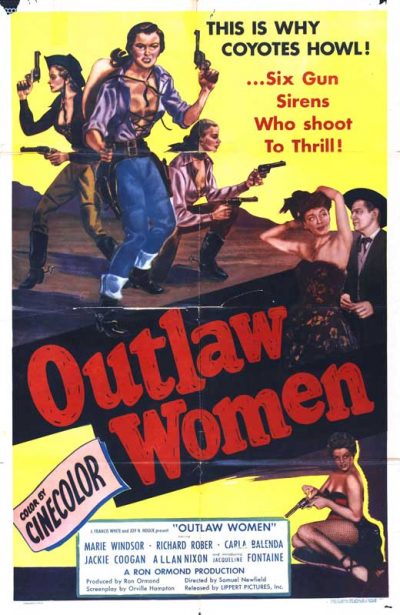★★★½
“Mother of all predators”
 This strange little film probably makes more sense if you’ve seen The Woman, in which a feral cannibalistic woman, played by McIntosh, was captured and kept in the basement of a dysfunctional family. While this features McIntosh in the same role, it does work as a standalone film: its predecessor may help explain some of the background. Here, the woman drops off her equally uncivilized teenage daughter (Canny) at a hospital. Unsure of quite how such an unusual child should be handled, Darlin’ – called that, because of a bracelet spelling that out which she is wearing – is handed over to the Catholic church.
This strange little film probably makes more sense if you’ve seen The Woman, in which a feral cannibalistic woman, played by McIntosh, was captured and kept in the basement of a dysfunctional family. While this features McIntosh in the same role, it does work as a standalone film: its predecessor may help explain some of the background. Here, the woman drops off her equally uncivilized teenage daughter (Canny) at a hospital. Unsure of quite how such an unusual child should be handled, Darlin’ – called that, because of a bracelet spelling that out which she is wearing – is handed over to the Catholic church.
In particular, to St. Philomena’s Home, a dubious institution run by an even more dubious Bishop (Batt). He sees in Darlin’ the chance for his parish to make a name for itself by “redeeming” their new ward in the name of the Lord, which would help them stave off an impending financial crunch. But when the Woman returns to the hospital, and finds her daughter is no longer there, it quickly becomes clear that she will go to any lengths to recover Darlin’ and punish those who are trying to exploit her. And even though the teenager is no longer quite the wild child she was, as the saying goes: You can take the child out of the woods, but you won’t necessarily take the woods out of the child…
McIntosh is probably best known for her work on The Walking Dead. But on this site, we adore her for Let Us Prey, and her directorial debut is little if any less savage. However, it is probably fair to say that the script – also written by McIntosh – tries to cram too many things into its pages, and comes up short as a result. Not to say there aren’t moments of supreme effectiveness. Just that they are diluted by the film’s desire to go in so many different directions. For example, despite the Woman’s apparently inexorable quest for Darlin’, she vanishes for much of the second half, instead just hanging round a homeless women’s encampment to no particular purpose. It’s a shame, as I don’t think I’ve seen a more genuinely scary female character in a film for a very long time. [Though Darlin’ doesn’t fall far from that tree, at least initially]
The rest is more hit or miss. Going after the Catholic Church for child abuse is… Well, it feels kinda obvious, though there’s a righteous anger here which does at least seem honest. And the civilized version of Darlin’, despite now being able to communicate through speech rather than growls, seems less interesting, as if she had lost much of what separated her from any other teenage girl. Neither of these really work so well, as the more linear concept of a mother prepared to do absolutely anything to reclaim her daughter, which is when the film is at its best and most memorable.
Dir: Pollyanna McIntosh
Star: Lauryn Canny, Bryan Batt, Nora-Jane Noone, Pollyanna McIntosh





 Even if the film doesn’t quite live up to the title and poster, it turned out to be better than I expected… from the title and poster, to be honest. It has been my experience that, the more lurid the advertising, the more disappointed I’m likely to be. Films like this often don’t just fail to deliver on what they promise, they also struggle with basic aspects of film-making, like plot and characterization, providing a double-whammy of failure. While the former is true here (no-one, at any point, is
Even if the film doesn’t quite live up to the title and poster, it turned out to be better than I expected… from the title and poster, to be honest. It has been my experience that, the more lurid the advertising, the more disappointed I’m likely to be. Films like this often don’t just fail to deliver on what they promise, they also struggle with basic aspects of film-making, like plot and characterization, providing a double-whammy of failure. While the former is true here (no-one, at any point, is  ★★
★★ Director Roberts returns for a sequel to
Director Roberts returns for a sequel to  While a serviceable entry in the beloved genre of “Charlize Theron kicks ass”, this does have to be classed as disappointing in comparison to the epic awesomeness which were
While a serviceable entry in the beloved genre of “Charlize Theron kicks ass”, this does have to be classed as disappointing in comparison to the epic awesomeness which were  After a boat-wreck, Jennifer Remming (Clemons) washes ashore on a deserted tropical island, and has to make do with what she can find and forage. While there are no other people on the island, she’s not alone. It becomes increasingly clear that a “something” is predating for food at night there. She eventually finds out what it is: a large, amphibious and very hungry creature, walking on two legs, and capable of dragging its prey back into its lair beneath the water. Needless to say, she’s delighted when two other survivors wash up in a lifeboat: her boyfriend Lucas (Cohen) and friend Mia (Mangan-Lawrence). But convincing them of the threat, and the need to get off the island immediately, is a little tricky, because it turns out Jennifer has a little history of making things up. However, “being eaten” turns out to be fairly convincing proof, as evidence goes…
After a boat-wreck, Jennifer Remming (Clemons) washes ashore on a deserted tropical island, and has to make do with what she can find and forage. While there are no other people on the island, she’s not alone. It becomes increasingly clear that a “something” is predating for food at night there. She eventually finds out what it is: a large, amphibious and very hungry creature, walking on two legs, and capable of dragging its prey back into its lair beneath the water. Needless to say, she’s delighted when two other survivors wash up in a lifeboat: her boyfriend Lucas (Cohen) and friend Mia (Mangan-Lawrence). But convincing them of the threat, and the need to get off the island immediately, is a little tricky, because it turns out Jennifer has a little history of making things up. However, “being eaten” turns out to be fairly convincing proof, as evidence goes… Having enjoyed the previous
Having enjoyed the previous  The city of Silver Creek is on the way out, and many of its inhabitants are leaving, including town doctor Bob Ridgeway (Nixon). Originally heading to Kansas City, he is convinced at gunpoint to take up a position instead in “Las Mujeres.” That’s Spanish for “The women,” and is an appropriate name since the place is a gynocratic society, where the ladies are in charge. Top of the heap is Iron Mae McLeod (Windsor), who runs the local saloon and ensures that the the other women in the town are kept safe from exploitation. She does, however, have to navigate the straits between aspirational gambler Woody Callaway (Rober) and outlaw Frank Slater. Ridgeway, meanwhile, because the target of affection for both Beth Larrabee (Balenda), one of Mae’s enforcers, and her big sister and star of the saloon’s show, Ellen. But when all of Mae’s money is about to be transferred out of Silver Creek, and becomes a target for Slater and his gang, romance has to take a back seat.
The city of Silver Creek is on the way out, and many of its inhabitants are leaving, including town doctor Bob Ridgeway (Nixon). Originally heading to Kansas City, he is convinced at gunpoint to take up a position instead in “Las Mujeres.” That’s Spanish for “The women,” and is an appropriate name since the place is a gynocratic society, where the ladies are in charge. Top of the heap is Iron Mae McLeod (Windsor), who runs the local saloon and ensures that the the other women in the town are kept safe from exploitation. She does, however, have to navigate the straits between aspirational gambler Woody Callaway (Rober) and outlaw Frank Slater. Ridgeway, meanwhile, because the target of affection for both Beth Larrabee (Balenda), one of Mae’s enforcers, and her big sister and star of the saloon’s show, Ellen. But when all of Mae’s money is about to be transferred out of Silver Creek, and becomes a target for Slater and his gang, romance has to take a back seat. After a disease has wiped out all adults, the town of Potters Bluff has divided into two camps, delineated by the river running through the town. On the west are the Titans, a quasi-fascist order of jocks operating out of the old high school and led by Jeremy, whose motto is “Strength, power, respect.” On the east are the free-spirited remainder, living under and protected by Jack (Bourgeois). However, after hijacking the contents of a Titan truck, Jack is abducted by them and held hostage. A three-person party sets out on a rescue mission: Jack’s sister Nat (Iseman), her best friend – and painfully obvious lesbian, right down to the mohawk – Scratch (Kwiatkowski), and Sony (Friese), a former Titan who recently defected to the East, and whose inside knowledge is essential to their survival and the success of the mission.
After a disease has wiped out all adults, the town of Potters Bluff has divided into two camps, delineated by the river running through the town. On the west are the Titans, a quasi-fascist order of jocks operating out of the old high school and led by Jeremy, whose motto is “Strength, power, respect.” On the east are the free-spirited remainder, living under and protected by Jack (Bourgeois). However, after hijacking the contents of a Titan truck, Jack is abducted by them and held hostage. A three-person party sets out on a rescue mission: Jack’s sister Nat (Iseman), her best friend – and painfully obvious lesbian, right down to the mohawk – Scratch (Kwiatkowski), and Sony (Friese), a former Titan who recently defected to the East, and whose inside knowledge is essential to their survival and the success of the mission. It’s the first day as a pizza delivery gal for Samantha Craft (Griffith), and things aren’t going well, with no tips being received. When given the chance of a delivery to a rich neighbourhood, she pounces – only to find herself getting stiffed again. This time, she sneaks in to demand her gratuity, which drops her in the middle of a satanic ceremony overseen by coven head, Danica Ross (Romijn). They’re attempting to summon Baphonet, but have hit a snag. Their intended vessel, Danica’s daughter Judy (Modine), no longer qualifies as a virgin, so Sam’s presence is highly convenient. For Sam? Not so much. Though perhaps to her benefit, there’s a bit of a power struggle in the coven, with Gypsy (Myrin) fed up of playing the second satanic banana to Danica.
It’s the first day as a pizza delivery gal for Samantha Craft (Griffith), and things aren’t going well, with no tips being received. When given the chance of a delivery to a rich neighbourhood, she pounces – only to find herself getting stiffed again. This time, she sneaks in to demand her gratuity, which drops her in the middle of a satanic ceremony overseen by coven head, Danica Ross (Romijn). They’re attempting to summon Baphonet, but have hit a snag. Their intended vessel, Danica’s daughter Judy (Modine), no longer qualifies as a virgin, so Sam’s presence is highly convenient. For Sam? Not so much. Though perhaps to her benefit, there’s a bit of a power struggle in the coven, with Gypsy (Myrin) fed up of playing the second satanic banana to Danica.